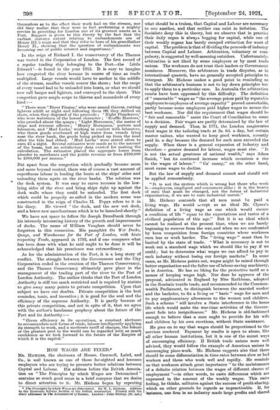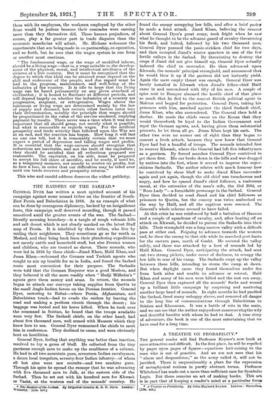HOW WAGES ARE FIXED.* Mn. Mama, the chairman of Messrs.
Cammell, Laird, and Co., is well known as one of those far-sighted and humane employers who are trying to promote better relations between Capital and Labour. His address before the British Associa- tion vn " The Principles by which Wages are Determined " contains so much good sense in a brief compass that we desire to direct attention to it. Mr. Hiohens began by repeating
• The Principles by which Wages are Determined. By W. L. lichens. Address to the Economic Science Section of the British Association. Printed with the other addresses is The Advancement of Science. London: Solur3larray. [63. not.] what should be a truism, that Capital and Labour are necessary to one another, and that neither can exist in isolation. The Socialists deny this in theory, but we observe that in practice their daily organ is alwayb begging for capital, while one of their weekly organs has barely escaped extinction for want of capital. The problem is that of dividing the proceeds of industry between Capital and Labour. Arbitration, voluntary or corn- pulsory, is suggested by well-meaning outsiders. Unfortunately, arbitration is not liked by some employers or by most trade unions. The workmen do not trust their leaden; or Government
nominees. Moreover, the arbitrators in trade disputes, as in international quarrels, have no generally accepted principles to interpret. Mr. Hichens makes a good point in reminding us that the arbitrator's business is not to lay down principles but to apply them to a particular case. In Australia the arbitration
courts have been oppressed by this difficulty. The definition of " reasonable " wages as " the average prices paid by reputable employers to employees of average capacity" proved unworkable, partly because some employers paid higher. wages to secure the best workmen. Nor did the requirement that wages should be
" fair and reasonable " assist the Court of Conciliation to come to a decision. Fair wages are partly determined by the law of supply and demand. Thus, in 1771, the London magistrates fixed wages in the tailoring trade at 2s. 6d. a day, but certain
master tailors, who wanted to keep good workmen, covertly paid 3s. a day because the demand for such men exceeded the supply. When there is a general expansion of industry and
therefore e greater demand for labour, wages must rise. " It is not the actual greatness of national wealth," says Adam Smith, ' but its continued increase which occasions a rise in the wages of labour." Ca' canny," on the other hand, must cause wages to decline.
But the law of supply and demand cannot and should not be applied remorselessly.
It is not the system which is wrong but those who work it—employers, employed and consumers alike ; it is the hearts of men that must be changed, not the forms of industrial organization, if we are to cure industrial unrest."
Mr. Hichens contends that all men must le paid a living wage. He would uccept as an ideal Mr. Clynes's definition of a living wage as one which would ensure a condition of life " equal to the expectations and tastes of a civilized population of this age." But it is an ideal which
cannot be realized at the present time, when we are barely beginning to recover from the war, and when we are confronted by keen competition from foreign countries where workmen earn less or work harder. The " living wage " must then be limited by the state of trade. What is necessary is not to work out a standard wage which we should like to pay if we could ; but to determine what wages we can afford to pay in each industry without losing our foreign markets." In some cases, as Mr. Hichens .points out, wages might be raised through better organization and the fuller use of labour-saving machinery, as in America. He has no liking for the protective tariff as a means of keeping wages high. Nor does he approve of the proposal, advocated in England by Miss Rathbone, adopted in the Roubaix textile trade, and recommended to the Common- wealth Parliament, to distinguish between the married worker and the bachelor, to fix a living or " basic " wage for men and to pay supplementary allowances to the women and children. Such a scheme " will involve a State interference in the home life which would make the war-time activities of the Govern- ment fade into insignificance." Mr. lichens is old-fashioned enough to believe that a man ought to provide for his wife and children by his own exertions, without State assistance.
He goes on to say that wages should be proportioned to the services rendered. Payment by results is open to abuse, like
all other human institutions, but it is one of the surest ways of encouraging efficiency. If British trade unions were well advised, they would follow the example of American unions in
encouraging piece-work. Mr. lichens suggests also that there should be some differentiation in time-rates between slow or bad
workers and those who work well and rapidly. He reminds us that workmen attach great importance " to the maintenance of a definite relation between the wages of different classes of
employment "—in other words, to caste differences which are expressed in the amount of the weekly wages. This caste feeling, he thinks, militates against the success of profit-sharing, which on other grounds he regards as impracticable. If, for instance, one firm in an industry made large profits and shared. them with its employees, the workmen employed by the other firms would be jealous because their comrades were earning more than they themselves did. These human prejudices, of course, play a far greater part in trade disputes than the economic mandarins will admit. Mr. Hichens welcomes the experiments that are being in co-partnership, co-operation, and so forth, but he sees- that the wages system in one form or another must continue.
" The fundamental wage, or the wage of unskilled labour, should be a living wage—that is, a wage suitable to the develop- ment of the physical, moral, and intellectual attributes of the citizens of a free country. But it must be recognised that the degree to which this ideal can be attained must depend on the skill and endeavour of the people, and due regard must be had to the progress, maintenance, and well-being of the industries of the country. It is idle to hope that the living WEI FP can be based permanently on any given standard of civilisation ; it is bound to fluctuate at different periods, and will depend largely on whether the industries of a country are progressive, stagnant, or retrogressive; Wages above the minimum or living wage are determined mainly by the law of supply and demand, but certain other factors enter into their determination, notably the principle that wages should be proportioned to the value of the service rendered, implying payment by results. There never was a time when it was more important that all should grasp, not merely what is possible, but what is reasonable as regards wages. For the artificial prosperity and trade activity that followed upon the War are at an end, and the reaction has begun. How long it will last no one can tell, but it is reasonably certain that we must expect a period of depression and falling wages and profits. It is essential that the wage-earners should recognise that reductions are inevitable, and not the fault of the capitalists ; they should be, satisfied that all reductions proposed are reasonable. The capitalist, on his side, must be prepared to accept his full share of sacrifice, and be ready, if need be, as a temporary measure, not merely to receive no profits, but to face a loss, in order that our difficulties may be tided over until our trade recovers and prosperity returns."
This wise and candid:address deserves the widest publicity.



































 Previous page
Previous page